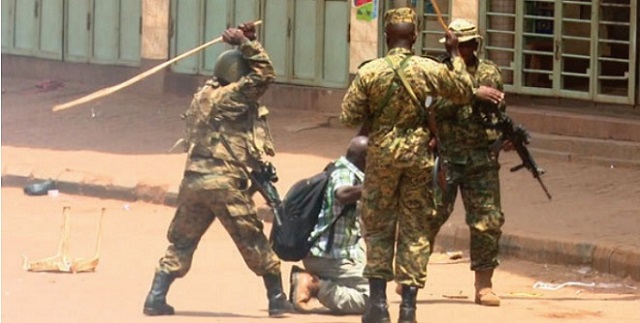
How the Ugandan media has borne the brunt of censorship for decades
Kampala, Uganda | GEOFFREY SSENOGA | The world watched in outrage recently as Reuters photojournalist, James Akena, was clobbered by three soldiers on the streets of Uganda’s capital Kampala in full view of television cameras. Akena was covering the demonstrations for the release of Robert Kyagulanyi, a member of parliament and pop singer also known as Bobi Wine.
Yoweri Museveni, who has been the East African country’s president for the past 32 years, tried to explain away the attack. He said he had been informed that it was a case of mistaken identity – Akena had been mistaken for a camera thief.
But for many in the media this was nothing new, as intimidation and violence is an almost daily threat. Uganda is now ranked 117th out of 180 countries in Reporters Without Borders’ 2018 World Press Freedom Index, five places lower than in 2017.
Uganda has a long history of media censorship. The country’s first postindependence head of government, Milton Obote who became prime minister in 1962, banned the intellectual Rajat Neogy’s Transition magazine. Idi Amin overthrew Obote in 1971 – during his regime, key journalists disappeared without trace.
The press was a central target during the second Obote government between 1980-1985 and its military successor. Museveni’s rise to power in 1986 was met with relief. It’s almost quaint to think back to a time when Uganda, under a newly elected Museveni, was held as a paragon of African democracy with all the freedoms it entails.
The period of hope
In 1990 four years after Museveni came to power the country was still experiencing a new political dawn. A Danish-produced documentary (still available in the archives of Uganda Broadcasting corporation television), then investigating the depth of freedom of the press in Uganda, was clearly enthralled.
The narrator exclaimed that: A free press in Africa, a rare thing in Africa.
Until the mid-1980s Uganda had been a political basket case. Mere differences of political opinion and free expression were deathly taboos. But the new political class that toppled the autocratic regimes of Obote and General Tito Okello announced the arrival of a new dawn.
As the then youthful Museveni was sworn in as the head of state on the steps of the parliamentary buildings in early 1986, he declared: This is not a mere change of the guard but a fundamental change.
The Danish documentary featured one of the rising stars in the media firmament, then editor of the respected (now defunct) Weekly Topic, Charles Onyango Obbo. He spoke on camera about the trustworthiness of the new political class, because “many of them come from liberal backgrounds”.
In fact many of the new political class were hardliners on the left. Obbo’s editor-in-chief Wafula Oguttu was just as effusive about the future of a free press. He pointed out that it was guaranteed under the Ugandan constitution and it could not be desecrated.
 The Independent Uganda: You get the Truth we Pay the Price
The Independent Uganda: You get the Truth we Pay the Price



